Darren Whiteside/Reuters
By
Cynthia M. Lardner
“Those who cannot remember the past are condemned to repeat it,” wisely stated George Santayana.
While Burmese Foreign Minister and State Counsellor Daw Aung San Suu Kyi, a Nobel Peace Prize Laureate, has come under harsh criticism from fellow Nobel Laureates and human rights groups failing to protect the Muslim Rohingya minority, victims of ongoing genocide and ethnic cleansing, the reality is that Mrs. Suu Kyi lacks the necessary power. That power rests with Burmese President Htin Kyaw who controls the military or Tatmadaw to initiate peace building.
If Mr. Kyaw fails to learn from the frozen Israeli-Palestinian conflict, and the ongoing conflict between the Kurdish Workers Party (PKK) and Turkey and Syria, his government will foster radicalization, recruitment and, ultimately, a jihadist terrorist cell in Southeast Asia.
While the West has already pledged its support to facilitate peace building between the two factions, the tipping point may be Chinese diplomacy. China may be the country best poised to exert diplomatic pressure, given its similar problems in the nearby Xinjiang Province, its position on Hong Kong and Taiwan, and its influence in Burma.
Historical Background
Affectionately referred to as “The Lady”, Mrs. Suu Kyi worked tirelessly to bring Burma, or Myanmar, from a “Militarized Junta” to an ever-increasing democratized nation. Burma’s second fight for democracy was hard won by Mrs. Suu Kyi, her political party, the National League for Democracy (NLD), and the predominantly Buddhist population.
It was only late summer 2007 when the Saffron Revolution, led by its revered monks, whose religious precepts preclude them from partaking in politics, took place. Under house arrest at that time, Ms. Suu Kyi’s image was widely displayed on placards demanding social, economic and political change.
Photo – Chaiwat Subprasom/Reuters
It would be another three years before Mrs. Suu Kyi’s house arrest would end. After elections were held in 2010 Mrs. Suu Kyi officially rose to long overdue political power. The West immediately engaged in peace building. She was quickly visited by leaders from many nations. In September 2012 Mrs. Suu Kyi visited Washington D.C. where President Barack Obama awarded her the Presidential Medal of Freedom and, after a near unprecedented Congressional address by a foreign national, she was presented with the United States Congressional Gold Medal.
In November 13 2015, five years to the day her house arrest ended, Mrs. Suu Kyi led the NLD to a majority win in Burma’s first contested election in 25 years, with the NLD securing two-thirds of the parliamentary seats. While her 2015 campaigns showed her visiting many Burmese factions, the reality is that hundreds of thousands of people, including the Rohingya, were denied voting rights.
Who Are the Rohingya?
Despite the existence of a Rakhine state dating back to the 8th Century A.D., the Rohingya, numbering 1 million, have suffered persecution and violence by the Burmese government since the 1960s.
In 1982 the Rohingya were stripped of citizenship making them a stateless people.
Between 1991 and 1992, rapes, forced hard labor, and religious persecution forced 250,000 Rohingya refugees to flee to Bangladesh. As was the case in 1978, a “Joint statement by the foreign ministers of Bangladesh & Myanmar issued at the conclusion of the official visit of the Myanmar Foreign Minister to Bangladesh 23 – 28 April 1992” acknowledged that the Rohingya were lawful Burmese residents. But, citizenship was never restored.
As the 2008 Constitution of the Republic of the Union of Myanmar only protects “Nationalists”, the Rohingya people have no rights – no freedom of movement, no ability to work, no health care, no education, no right to vote, and no right to more than two children per family. This cemented the Rohingya population’s position as a truly stateless and vulnerable population; much the same as the Turkish Kurds in northern Syria.
Since 2012 25,000 Rohingya have fled to Bangladesh, Indonesia, and Malaysia. The Burmese military has since shut down migration routes to Malaysia. This has left Bangladesh, from where the Rohingya originate, as the only option. But, the impoverished Bangladeshi government refuses to grant fleeing Rohingya refugee status and repatriates those Rohingya caught living within its borders.
Like other Burmese people, their faith had been placed on the rise of Mrs. Suu Kyi to power. In a 2013 BBC interview Mrs. Suu Kyi attributed the problem to fear by both sides. She stated that, “We cannot become a genuine democratic society with the [current] constitution… People assume too readily that on a path to democracy – that we are democratising at a fast rate – but it is not happening like that at all.” Mrs. Suu Kyi concluded by stating that it was essential that “Rule of Law” be implemented in country had been previously governed by a dictatorial regime.
On 29 March 2014 the Burmese government banned the word “Rohingya”. This accounts for Mrs. Suu Kyi not addressing the Rohingya during interviews.
Prior to the 2015 elections, following a ruling by the Constitutional Tribunal, the Parliament revoked, effective April 1st, all temporary identity cards – known as “White Cards” – held by Rohingya Muslims and other ethnic groups, which had allowed them voting rights.
After the expiry of the White Card, the government announced the issuance of a new National Verification Certificate (NVC). Only 300,000 Rohingya surrendered their White Cards because the bearer’s ethnicity and religion is not stated on NVC, which can be later exchanged for a Green Card. Cardholders can than apply for citizenship under untenable conditions – applicants must renounce the term Rohingya, accept the designation Bengali, and provide evidence of three generations of Burmese residence. This is worse than Israel where only Jews qualify for citizenship. Pursuant to the Oslo Accords, since April 1995 the Palestinian Authority, a non-sovereign state, has issued a “passport” to Palestinian residents of the Palestinian territories for the purpose of international travel.
Escalating Tensions Between the Rohingya and Burmese Government
Since 2012 tensions between the Rohingya and the Burmese “Nationalists” have rapidly escalated. Along with the military, many attacks on the Rohingya have been spearheaded by the same monks who led the 2007 “Saffron Revolution”.
The July 2013 Time magazine was titled “The Face of Buddhist Terror?”
“As a monk I shouldn’t say this, but there is only one way to solve the problem: we must fight back. We must fight violence with violence,” confided one monk to Alex Preston who conducted interviews in Burma in 2015. Mr. Preston concluded that the monastics see “…an international conspiracy funded by Muslim countries from Saudi Arabia to Malaysia, are taking up arms against Islam.”
Monks take over 100 precepts or vows, while the laity takes the first five precept – the first of which is to avoid killing or harming sentient beings. In the news, there often appears the term “hardline Buddhists” referring not to those who enforce the morality underpinning Buddhist but, who actively engage in violence against the Rohingya.
Attacks from within the Rohingya community increased this past fall with the appearance of the counter-insurgency group Harakah al-Yaqin or Faith Movement Arakan (HaY). HaY is funded and led by a committee of Rohingya émigrés in Saudi Arabia. On the ground HaY is commanded by Rohingya who underwent two years of training in guerrilla warfare tactics and explosives by Afghani and Pakistani fighters. HaY came into being because the Rohingya gave up any hope of a political solution.
HaY led the October 9th attach on Burmese border posts along the Burmese-Bangladesh border killing 9 border officers and 4 soldiers. In January 2017 prison officials told United Nations Special Rapporteur to Burma Yanghee Lee that more than 450 individuals had been detained in conjunction the October 9th attacks.
On October 17th HaY released a five minute video manifesto:
“Citizens of Arakan, citizens of Myanmar, and citizens of the world.
It is no longer a secret that the Rohingyas are the most persecuted ethnic minority on earth. Throughout the last six decades, we have been subjected to genocidal mass-killings, and all kinds of atrocities in the hands of the successive Burmese tyrannical regimes.
The world has chosen to ignore us! Then again, the “resourceful” world has apparently failed to save us!
We, the sons of Arakan soil who are compelled by our dire situation to make our own destiny through uprising, self-determination in self-defence.
We stand as an independent body which is free from all elements of terror in any nature but seeks fundamental but legitimate rights and other justice for all Arakanese including our innocent Rohingyas and other civilians dying from the continuous military assaults.
We categorically state that our people have chosen to free themselves from oppressors, from the tragic deaths in the Bay of Bengal, in the Thai jungles and in the hands of human traffickers. We are also resolved to defend our mothers, sisters, elderly, children and ourselves.
We shall not rest until all our desired goals are achieved with the genuine help of the civilised world.”
What is significant is that, at this time, HaY is not a terrorist or jihadist organization. Rather, per its manifesto, HaY only seeks to protect the Rohingya.
A further attack by HaY on November 12th killed a senior military officer. The response was sure and swift with the Burmese military killing 69 counter-insurgents. This was followed by the use disproportionate and nondiscriminatory military force, including the torching of 1,200 homes, extrajudicial killings and forcing 150,000 Rohingya into inhumane camps. The military has since cordoned off a section of northern Maungdaw Township to conduct “area clearance operations”.
In United Nations Special Rapporteur to Burma January 17, 2017 Report Ms. Lee stated that:
“I was told by Government officials – as had been reported – that it was the villagers who had burnt down their own houses. And the reason they would burn down their own houses was because these houses were of poor quality; and by burning down their own houses, they can expect to get international actors to come in and help build them better houses. The authorities offered no evidence for this, and I find this argument quite incredible.”
Humanitarian agencies have been all but denied access to 30,000 internally displaced people in the sealed-off area and to an additional 130,000 Rohingya previously receiving life-saving aid. Ms. Lee reported that there were “preventable deaths due to lack of access to emergency medical treatment”.
Genocide Watch has declared a Genocide Emergency signaling that a genocide is underway in Burma:
“Burma, Southeast Asia’s most oppressed nation, remains under the forty-three year tyranny of a military junta and should be a grave concern to the international community. Abuse of ethnic minorities, mass rape of women, mandatory relocations, extrajudicial state executions, military recruitment of children, and forced labor are only a few of the many violations of human rights currently practiced in the resource rich but economically impoverished nation.”
The International Dilemma
The world has erroneously looked to Mrs. Suu Kyi to work a miracle. The reality is If Mrs. Suu Kyi does not walk a fine line she could fracture what relationship she has built with the military and cost her party the votes of “hardline” Buddhists in the 2020 general election jeopardizing the fledgling democracy.
Tom Andrews, a former United States Senator who now heads United To End Genocide, stated that, “There’s no one domestically to stand up and speak out for the Rohingya. This makes it all the more important for the international community to exert power and make it count.”
The international community must pay close attention to how it conceptualizes the Rohingya atrocities as this same scene has been playing itself out elsewhere for decades. Consider the frozen Israeli-Palestinian situation, as well as plight of the Kurdish Workers Party in Syria and Turkey. Both situations involve a marginalized population seeking a safe haven where religious and cultural beliefs can be freely practiced. Indeed that is the very definition of democracy. Decades passed without a mutually acceptable resolution. Violence escalated. The deprivations and denial were the recipe for radicalization, recruitment, and rise of jihadist terrorist cells.
This could be an opportunity for China, which desires a greater global leadership role, to exert its influence and even upstage Western countries. China has phenomenal influence with Mr. Kyaw as China is Burma’s leading trade partner. China would never advocate for Rohingya human rights but, it may be interested in preventing the growth of another border radicalized terrorist cell, which could spill neighboring Thailand which has experience violent clashes with the growing Muslim minority.
China’s western Xinjiang Province is home to 11.3 million Uighurs; ethnically Turkic Muslims. In an effort to suppress a cultural identify different than Han identify promoted by the government, as is the case in Tibet, the government has moved considerable numbers of Han Chinese into the province. As the Uighur struggle to maintain their cultural identity, there have been increasingly violent clashes between the Uighurs and Chinese government.
An English-language magazine allegedly released by al-Qaeda described Xinjiang as an occupied Muslim land to be recovered by ISIL. China claims that the Uighur separatists are al-Qaeda operatives trained in Afghanistan. Whatever the truth, Uighur separatism is a potent and potentially violent force. If there is not already a radicalized terrorist cell operating in Xinjiang, the government is most certainly fearful of that potentiality. Neutralizing the situation in Burma would only work to China’s advantage. China has already used soft power in neighboring Pakistan and Afghanistan where terrorism runs rampant.
China’s “Position Paper against International Terrorism” starts with the premise that, “The fight against terrorism calls for protracted and concerted efforts of the international community,” and concludes that “There should be a comprehensive approach, involving political, diplomatic, economic and other means, to address both the problem of terrorism and its underlying causes, in an effort to eliminate the root causes of terrorism.” China’s governance of Taiwan and Hong Kong may provide a political model for peace building.
China would not be alone in its efforts. In a December 16th Joint Statement Finland, France, Greece, Ireland, the Netherlands, Poland, Spain, Sweden, Turkey and the United States it was:
“…not[ed] that tens of thousands of people who need humanitarian aid, including children with acute malnutrition, have been without it now for nearly two months.
This assistance is desperately needed to address serious humanitarian needs but also to begin to restore the confidence and hope? that are essential to a restoration of peace and stability. Full and unfettered access is essential for humanitarian agencies to conduct a comprehensive assessment of current humanitarian needs in support of the Government’s humanitarian response. The re-establishment of access to markets and livelihoods is also very important.”
The Joint Statement offered peace building and peace keeping support.
According to the United Nations “The term “Peacebuilding” was coined in 1970s by Johan Galtung who called for the creation of peacebuilding structures to promote sustainable peace by addressing the “root causes” of violent conflict and supporting indigenous capacities for peace management and conflict resolution. Since then, the term Peacebuilding has covered a multidimensional exercise and tasks ranging from the disarming of warring factions to the rebuilding of political, economic, judicial and civil society institutions.”
Using conditional soft power to facilitate stabilization, including complying with Rule of Law, creating sustainable infrastructures for of Rohingya population and security sector reform, may be the only option. Soft power is the use of any inducement short of direct military intervention to achieve a greater objective. John McKissick, UNHCR head in Bangladesh, confirmed that, “Efforts to resolve the issue must focus on “the root cause” inside Myanmar.”
“When dealing with peace building there exists the concept of a peace dividend. “A peace dividend should be timely and tangible: can people see it, or feel it, or use it, or spend it? … Dividends help to meet people’s expectations for improved welfare and increased opportunity following a conflict; these expectations, left unfulfilled, can cause a conflict to flare up again, or contribute to a culture of violence and lawlessness, or discourage people’s participation in building lasting peace,” according to Sarah Laughton and Nicholas Crawford, World Food Programme.
Economic sanctions are the opposite of a peace dividend. In 2012 the United States eased certain economic sanctions against Burma to promote Rule of Law, as did the European Union in April 2013. Given the festering South China Sea dispute, President Donald Trump’s abandonment of the Trans-Pacific Partnership, and Burma’s position on Andaman Sea, sanctions would not only impede the United States objectives in Burma but would further weaken its position in Southeast Asia.
Another driver for the United States, as noted by political risk analyst Dr. Anders Corr, may be protecting the United States corporations – including Chevron, Caterpillar, Ford, John Deere, Chevrolet, G.E. and Shell – which have heavily invested in Burma. While Exxon is not active in Burma, given Mr. Trump’s Secretary of State nominee, former Exxon CEO, Rex Tillerson, who has professional ties through-out the oil and natural gas industry, contrasted with what is evolving as a foreign policy driven by isolationism, it is a mystery what direction the Trump administration will take.
While having the best of intentions, a late December open letter, signed by twenty-three leaders, including nine Nobel Peace Prize Laureates, was delivered to the UNSC urging “…members of UN Security Council to put this crisis on Security Council’s agenda as a matter of urgency.” This will never happen as China, a P5 member of UNSC, would veto any UNSC resolution.
The author with former United Nation Secretary-General Ban Ki-moon at the inauguration of the new ICC complex on April 19, 2016
Cynthia M. Lardner
Cynthia M. Lardner is an American journalist living in The Hague writing about geopolitics for Tuck Magazine and E – The Magazine for Today’s Executive Female Executive. Her blogs are read in over 37 countries. As a thought leader in the area of foreign policy, her philosophy is to collectively influence conscious global thinking. Ms. Lardner holds degrees in journalism, law, and counseling psychology.
Sources

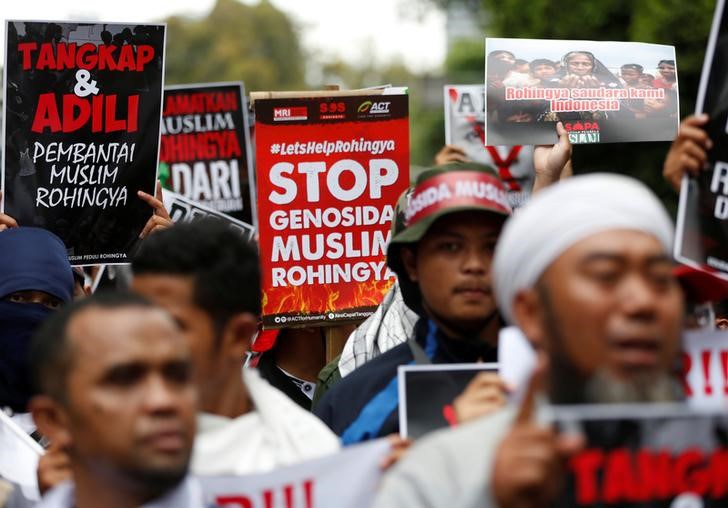
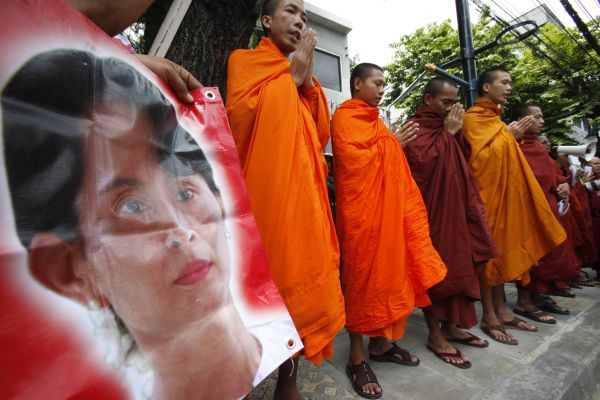
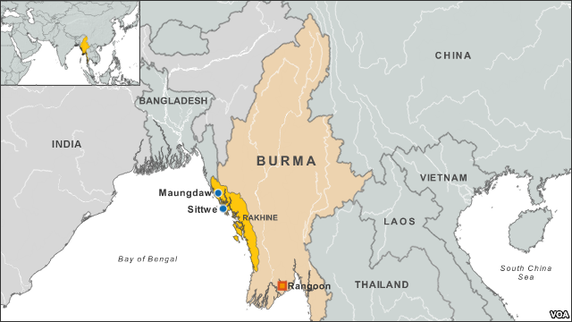
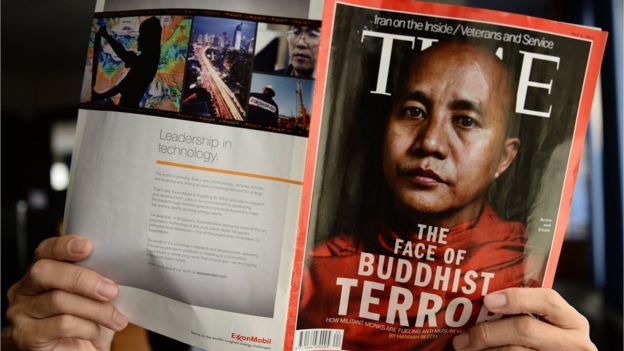
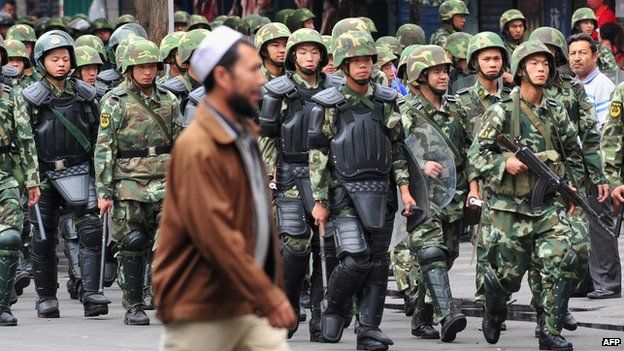
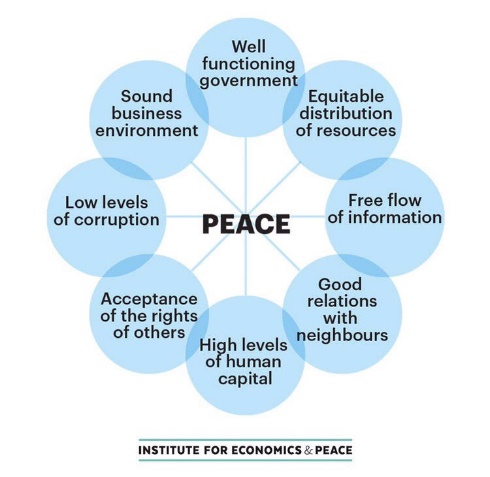
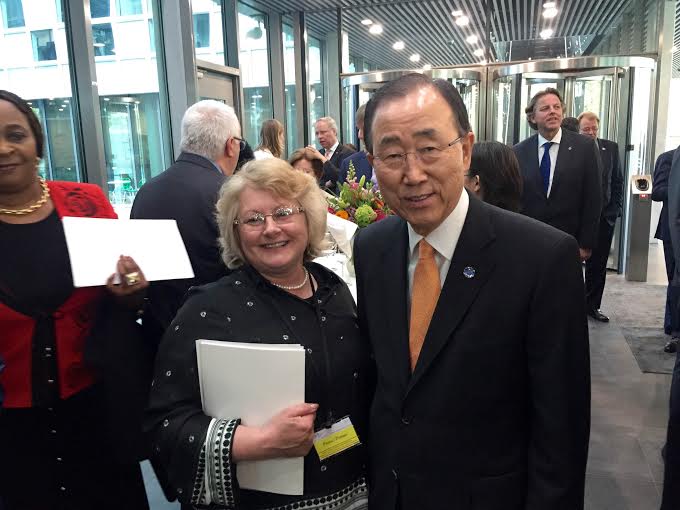
No Comments Yet!
You can be first to comment this post!